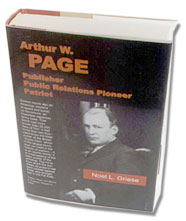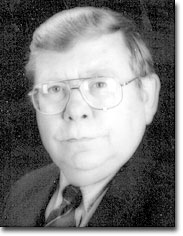|
Arthur W. Page, for whom the Arthur Page Society is named,
was born to wealth and status and spent most of his life at
the highest levels of business, social and public life, according
to a biography by Noel L. Griese, veteran PR executive and
author who now lives in Atlanta.
The book is $24.95 U.S. from www.anvilpub.com.
 Griese's biography
of Page dubs him a "publisher, PR pioneer and patriot."
Griese's biography
of Page dubs him a "publisher, PR pioneer and patriot." |
Page's father was Walter Hines Page, a self-made editor and
publisher who founded Doubleday, Page and Co. with Frank Doubleday
in 1899.
Walter Page started his own newspaper in the half-basement
of a hardware store in Raleigh, N.C., in 1883 after rising
to literary critic and editorial writer at the New York World.
He was named ambassador to England in 1913.
Arthur Page, born in 1883, was sent to the Lawrenceville
prep school near Princeton and then to Harvard, where his
older brother Ralph was also enrolled.
Page, who died in 1960, was a reporter and later editor for
his father's national magazine, World's Work, from 1905-15.
He was a VP at Doubleday, Page from 1916-26, supervising six
magazines and publication of nonfiction books.
After an acrimonious dispute with Frank Doubleday in 1926,
Arthur Page left the company, sold back the family stock and
asked that the Page name be removed from Doubleday, Page.
His father had died in 1917. He had become exhausted after
trying to persuade President Woodrow Wilson to enter the war
on the side of the Allies.
Arthur Page in 1927 became the first VP of PR at AT&T,
remaining until 1946.
He is often hailed as one of the "fathers of PR"
and is sometimes called the "father of corporate PR."
A poll conducted by Public Relations Society of America in
1970 placed him seventh on a list of "the most outstanding
PR professionals" behind Ivy Lee, John W. Hill, Pendleton
Dudley, Carl Byoir, Edward L. Bernays and Earl Newsom.
Principles
of Page Society Listed
Page's principles, upon which the Page Society is based,
seem pretty fundamental: tell the truth; prove it with action;
listen to the customer; manage for tomorrow; conduct PR as
if the whole company depends on it, and remain calm, patient
and good-humored.
Motivating employees was also a main goal of PR, according
to Page.
 Author Noel Griese
Author Noel Griese |
Writes Griese: "Page believed that actions in the public
interest were far more important than publicity in creating
good will for business...(PR) is 90 percent doing and only
10 percent talking about what was being done."
The Page Society today has nearly 300 members, almost all
of them corporate. Membership is by invitation only. www.awpagesociety.com.
Page was quite conservative by today's standards, the Griese
biography makes clear.
He started out as a Democrat but switched to a Republican
while working for AT&T.
Opposed
New Deal
He was an ardent foe of President Franklin Roosevelt and
the New Deal, believing the program "imposed restrictions
on liberty."
His letters reveal his belief in the "British system
which he thought to have few specific rules on individuals
and corporations but severe penalties for violations of the
rules," writes Griese.
Commenting on federal economic planning and increased taxation
in 1938, Page wrote:
"Now I think we are trying the centralized planning
in a large number of fields in which we have little experience–under
the general philosophy that if no one is allowed to get rich
all will be better off...in a country where the opportunity
to get rich is banned the fate of the poor will be bad..."
Page's son, John Hall Page, told Griese that his father's
political outlook was not determined by his employment at
AT&T.
"Dad was always an independent citizen of the United
States...he would never accept the proposition that he was
first an `AT&T man' or a `Chase man.' He was Citizen Page
first," Hall told Griese (Page was a director of Chase
National Bank).
Another son, Arthur W. Page Jr. told Griese that Page was
not the "polished, socially conscious, aristocrat and
club man" that the book seems to portray him as. "He
was a democrat as opposed to an aristocrat," said A.W.
Page.
(Page had a third son, Walter Hines Page II. All three sons
went to Harvard and had illustrious business careers. Walter
became president of the Morgan bank in 1971. A daughter, Mollie,
graduated from Bennington and married advertising executive
Anderson Hewitt.)
While Page belonged to the New York Yacht Club and Harvard
Club, among other clubs, he went there and elsewhere for conversation
with people with similar interests, John Page told Griese.
Among Page's friends was Bruce Barton, a founder of the Batten,
Barton, Durstine & Osborn ad agency. Arthur and his wife
Mollie often played bridge with the Bartons during the social
season, writes Griese, who described Arthur Page as "less
exuberant and more reserved and formal" than his father.
Joined
John Hill's "Wise Men"
Page was an early and active member of "The Wise Men,"
founded in 1938 in the apartment of John Hill, founder of
Hill and Knowlton.
The group, which continues its monthly meetings to this day,
took in members by invitation only and included about 60 blue
chip corporate and agency PR executives.
Hill described Page as one of the star members of the group
who talked seldom but had plenty to say when he did talk.
"Once he started speaking, no one wanted him to stop
because he could express himself so well," Hill is quoted
as saying. Page remained in the group until the early 1950s.
Initially
Liked Newsmen as Publicists
An editorial in the July 1906 World's Work praised the hiring
of "publicity men" by big business "as a step
toward abandonment of secrecy." The editorial indicated
that working journalists would be best at this job.
It said they would be more accurate sources of news than
company men who were not accustomed to writing news.
News prepared by publicists would be distrusted by the public
"as an attorney's givings-forth are received," said
the editorial.
But as VP-PR of AT&T, then the biggest company in the
U.S., Page said PR was best staffed from within by those who
knew about the business of AT&T rather than about writing
news.
Held
Many Important Posts
Page was an important player in business and public life
for decades.
Some of his key appointments arose from his close relationship
with Henry L. Stimson, who was Secretary of War under President
William Taft; Secretary of State under President Herbert Hoover,
and Secretary of War under Presidents Franklin Roosevelt and
Harry Truman.
The Pages and Stimsons had nearby estates on the North Shore
of Long Island and for many years "spent perhaps three
Sunday evenings out of four" having dinner with each
other, Griese writes.
–Page served in France in World War I on Black Jack
Pershing's American Expeditionary Force staff in a small intelligence
unit.
–He was Stimson's press secretary at the 1930 London
Naval Conference.
–He went to England and France for three months in 1944
to oversee troop information for the Normandy Invasion.
–He wrote the statement released on Aug. 6, 1945, in
the name of Harry Truman, on the dropping of the atomic bomb
on Hiroshima.
–He chaired the Joint Army and Navy Committee on Welfare
and Recreation during World War II.
–He was a prominent member of the Council on Foreign
Relations and was a key member of the Stimson Committee for
the Passage of the Marshall Plan.
–He was one of the founding members of the National
Committee for a Free Europe, parent of the CIA's Radio Free
Europe operation.
–He also played prominent roles in the NCFE executive
committee and the Crusade for Freedom at the time of the 1953
Berlin and 1956 Hungarian revolts.
Griese, who was director of corporate communications of the
Colonial Pipeline Co. in Atlanta from 1980-99, when he retired
is the author of How to Work with Angry People and Outraged
Publics and How to Manage Organizational Communications During
a Crisis. He taught PR and news journalism at the University
of Wisconsin and University of Georgia and is now writing
a history of Georgia ([email protected]).
|
